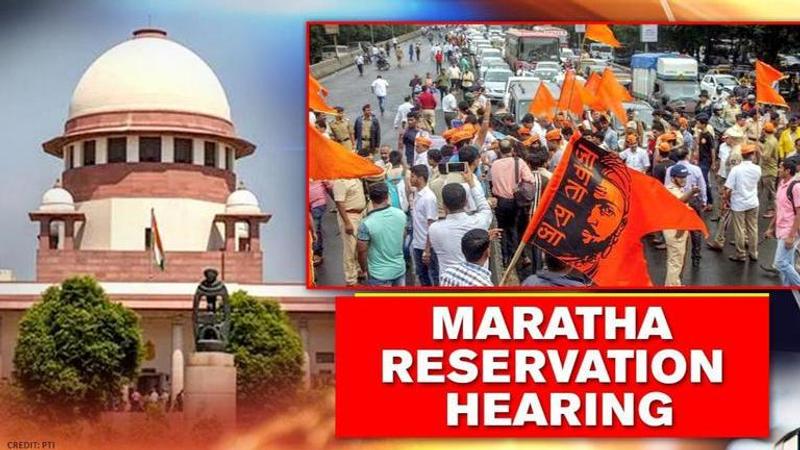Published 18:51 IST, August 28th 2020
Maratha reservation: SC adjourns hearing on referring issue to 11-judge bench to Sept 1
Supreme Court on Friday, adjourned the hearing on referring the matter to an 11-Judge Bench to consider if the state can exceed 50% ceiling on the reservation

Hearing pleas on Maharashtra's Maratha reservation, the Supreme Court on Friday, adjourned the hearing on referring the matter to an 11-Judge Bench to consider if the state can exceed 50% ceiling on the reservation to Tuesday - Sept 1. The matter was heard by a three-judge bench led by Justice LN Rao after the matter was listed on July 15. The petitioners include - Maharashtra government (represented by Abhishek Manu Singhvi), Opposition pleas (represented by Gunaratna Sadavarte).
Maratha reservation case: Hearing on Sept 1
Singhvi, while arguing the case sought the referral of the matter to a larger bench pointing out that several states had reservations over 50%. Similarly, advocate S Patwalia too stated that since the issue of the Economic Weaker Section (EWS) reservation was pending before a 5-judge bench, this issue too must be referred to a larger bench. On the other hand, advocate Gunratan Sadavarte highlighted that if ''STs are not permitted to get benefit in breach of 50%, neither should the influential Maratha community".
SC refuses to stay Bombay HC order
Earlier in February, the Supreme Court had refused to stay the Bombay High Court order upholding a Maratha reservation law while examining the constitutional validity of the law granting reservation for Marathas in education and jobs. The apex court said, however, that the aspect of the HC verdict allowing the quota with a retrospective effect, from 2014, would not be made operational. Meanwhile, the Maharashtra government has stated that 'Marathas are not eligible for EWS quota' in the state.
In June 2019, after a year of Maratha agitation, the Maharashtra Legislative State Assembly passed the amendment in the Socially Economically Backward Class Act including 16% reservation in universities and government jobs. The Bombay High Court upheld the decision but reduced the quantum to of the reservation to 12% and 13% for social (jobs) and educational purposes. This brought the total reservation in Maharashtra up to 72% along with the Economically weaker section (in general category) reservation of 10%, passed by the Modi government.
Maratha reservation protest
Previously, in August 2018, thousands of protesters took to the streets of Maharashtra demanding reservations in jobs and education. While Pune and Aurangabad witnessed violent protests, demonstrations also took place in Mumbai and Thane. Succumbing to the powerful Maratha community's demand, then-CM Fadnavis announced amendment in the Socially Economically Backward Class Act including 16% reservation in universities and government jobs. While the Bombay High Court upheld the reservation, reducing its quantum, the government too had passed a law ratifying the reservation. Now, the Thackeray-led Aghadi government is preparing to introduce a Muslim-based reservation in the state.
Updated 18:51 IST, August 28th 2020




